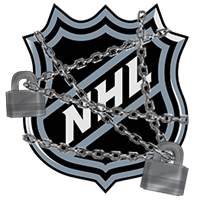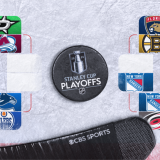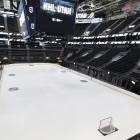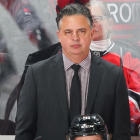 This is Day 22 of the NHL lockout, 2012 edition. Every day, we'll serve up some CBA talk and help you get your hockey fix. Let's begin, shall we?
This is Day 22 of the NHL lockout, 2012 edition. Every day, we'll serve up some CBA talk and help you get your hockey fix. Let's begin, shall we?
CBA roundup
• Player agent Allan Walsh always has an opinion on anything in hockey, from the third sweater of the Boston Bruins to the airlines the players fly all the way to the CBA, of course. He's always outspoken on his Twitter account, constantly arguing in favor of the players. That was all in shorthand, limited by 140 characters at a time. But Walsh talked to Dave Feschuk of the Toronto Star and, well, his tenor didn't change.
"It's clear to most people that the NHL has been planning this lockout for a long time. It's clear, with the way the NBC deal was negotiated and the $200 million payment whether games are played or not, that the NHL has been laying the groundwork for this lockout for a significant period of time." (Toronto Star)
• Bob McKenzie is a reporter for TSN and probably the best there is. The man is known as the Godfather of Hockey in some circles because he has his hand on the pulse of the NHL at all times. Why do we share this information with you? Because McKenzie is pessimistic, verrrrrry pessimistic. He was busy tweeting his thoughts on Saturday night, and here's the crux.
"My instincts say we'll lose the whole year but we've still got a month or two to salvage a Dec or Jan start up, so we'll see." (Kukla's Korner)
• In Saturday's daily fix, Adam Gretz shared a Q&A with commissioner Gary Bettman from the Globe and Mail. In the interest of fairness, Sunday's hockey fix brings you the other side of the equation with Donald Fehr. Here's a taste: Why do the players feel entitled to a greater percentage of the hockey-related revenue?
First of all, when you get into entitled, you're getting into a very strange concept in a capitalist economy. A player is entitled to a job, but if he can't play, he doesn't have the job. Not only that, if he plays this year as well as he did last year, but you find somebody else better, he won't have the job. Second, were this an industry in which the owners were prepared to say: 'We will have a free market, and let the owners do whatever they want with salaries on an individual basis and players can negotiate and if it works out better for an individual player or worse for an individual player, that's the way it is?' As long as they didn't conspire on salaries, the players would take that tomorrow, and every club could have its individual risk and every owner make a judgment. The problem is that the owners want a salary cap, and any salary cap -- even 57 per cent -- underpays the players in the aggregate. Otherwise the salary cap is no good to the owners. It's only good if it caps or artificially limits what the salaries would be." (Globe and Mail)
• The lockout is still in its infancy, and already the businesses and workers in Buffalo (and likely elsewhere) are feeling the squeeze. This is easily the worst part of a lockout. (Buffalo News)
Hockey fix
Today we bring you a two-part highlight. Remember that second round playoff series between the Capitals and Rangers, the one that included the longest game of the postseason? There was also perhaps the most exciting finish in the postseason. The Rangers got a four-minute power play with 21 seconds left down 2-1, and Brad Richards scored the equalizer with 6.6 seconds to go. Then Marc Staal put home the winner very early into overtime (still on the same power play) to cap the comeback and give the Rangers a series-changing win in Game 5. Madison Square Garden's roof nearly popped off.
For more hockey news, rumors and analysis, follow @EyeOnHockey and @StubitsCBS on Twitter and like us on Facebook.




















